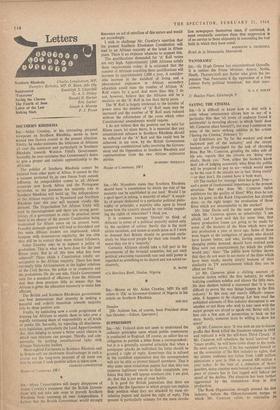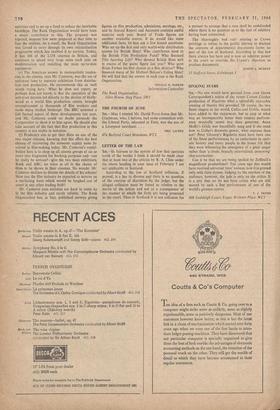SAVING THE CINEMA
SIR,—It is difficult to know how to deal with a critic whose omniscience allows him to say of a particular film that 'all levels of audience found it intolerable' (a revealing phrase; in which 'level' does Mr. Cameron place himself?), but may I comment on some of the more striking oddities in his article ('Saving the Cinema,' February 7):
(a) Exhibitors are 'by far the weakest and most backward part of the industry,' and the circuit bookers are ill-equipped for the task of choosing films. But Mr. Cameron, grinding the other side of his axe, reports that the circuits are 'doing very nicely, thank you.' Now, either the bookers know their job of judging accurately what films the public will he prepared to pay to see—which would seem to be the case if the circuits are in fact 'doing nicely' —or they don't. He cannot have it both ways.
(b) The market for 'average' films has gone. True— and a point of fundamental importance in the present situation. But why does Mr. Cameron indict exhibitors for the quality of films? Why does he not turn his guns, as the Rank Organisation has already done, on the right target: the production of those films which are unacceptable to the market?
Mr. John Davis said (in the same speech from which Mr. Cameron quotes so selectively): 'I am afraid, and I have said this for some time, that heavy production losses are going to be made by some of the backers of the films which were put into production a year or more ago. Some of these were begun at the instigation of people who should have known better, and who, having assessed the changing public demand, should have realised such films were not entertainment for which the public would pay.' Also: 'The public have further shown that they do not want to see many of the films which have been made, maybe simply because of their similarity to TV entertainment which they can in effect see free.'
(c) Mr. Cameron gives a chilling account of terrorist tactics within the film industry, by which bullying combines subdue and silence the little men. He then shelters behind a statement that 'it is very difficult to prove the way things happen in the film industry.' In this case, not merely difficult—impos- sible. It happens to be claptrap. Let him read the published accounts of film industry discussions to see whether or not those who wish to take issue with the major groups arc afraid to speak out. Better still, let him cite a few acts of persecution to back up his story. Surely, someone must be willing to show his scars?
(d) Mr. Cameron says: 'It was with an eye to future profits that Rank killed the Gaumont release in 1958 and replaced it with the still-born Third Circuit.' If Mr. Cameron will substitute the word 'survival' for 'future profits,' he will have come closer to the truth. He must surely know, if he has equipped himself to set the economics of the film industry to rights, that the cinema audience has fallen from 1,600 million admissions a year in 1946 to around 400 million a year today. In the face of a reduction of three- quarters, many cinemas were bound to close—and the pace of closure has in fact lagged well behind the speed of the decline. The situation has been further aggravated by the tremendous drop in film production.
The Rank Organisation strongly pressed the film industry, before the Odeon-Gaumont merger to which Mr. Cameron refers, to rationalise its activities and to set up a fund to reduce the inevitable hardships. The Rank Organisation would have been a major contributor to this. The proposal was rejected, because few were prepared at that time to face the realities. As a result, the Rank Organisation was forced to carry through its own rationalisation programme which, has enabled it to survive. Today, it has 346 of the 2,158 cinemas in Britain, and continues to spend very large sums each year on modernisation and installing the most up-to-date equipment.
(e) The American answer to monopolistic tenden- cies in the cinema, says Mr. Cameron, was the use of anti-trust laws to separate exhibition from distribu- tion and production. He recommends this as 'well worth trying here.' What he does not report, or perhaps does not know, is that the operation of the anti-trust decrees led directly to the decline of Holly- wood as a world film production centre, brought unemployment to thousands of film workers and made many studios bankrupt. The BBC screened a full factual report of these developments last year, and Mr. Cameron could no doubt persuade the Corporation to show it to him again. He should also take account of the fact that film production in this country is not viable in isolation.
(f) Producers aim to get their films on one of the two major releases, knowing that this offers the best chance of recovering the immense capital sums in- volved in film-making today. Mr. Cameron's contri- bution here is to chop up all cinema groups of six or more into fragments for booking purposes and—can he really be serious?—give the two main exhibitors, Rank and ABC, no voice at all in the choice of films to be shown in their cinemas. No wonder Mr. Cameron declines to discuss the details of his scheme! How can the film industry be expected to survive on a marketing basis which would be laughed out of court in any other trading field?
Mr. Cameron says statistics are hard to come by in the film industry and rarely reliable. The Rank Organisation has, in fact, published surveys giving
figures on film production, admissions, earnings, etc., and its Annual Report and Accounts contains useful material each year. Board of Trade figures are another available source. If he would like some additional facts, let him ask a few honest questions: Who set up the first and only world-wide distribution system for British films? Who contributes most to the British Film Production Fund? Who financed This Sporting Life? Who showed British films well in excess of the quota figure last year? Who gave Brian Forbes his first chance as a film director? Who financed many of Sir Michael Balcon's Ealing films? He will find that the answer in each case is the Rank Organisation.
DONALD H. HARKER Information Controller
The Rank Organisation, Glen House, Stag Place, SW 1







































 Previous page
Previous page